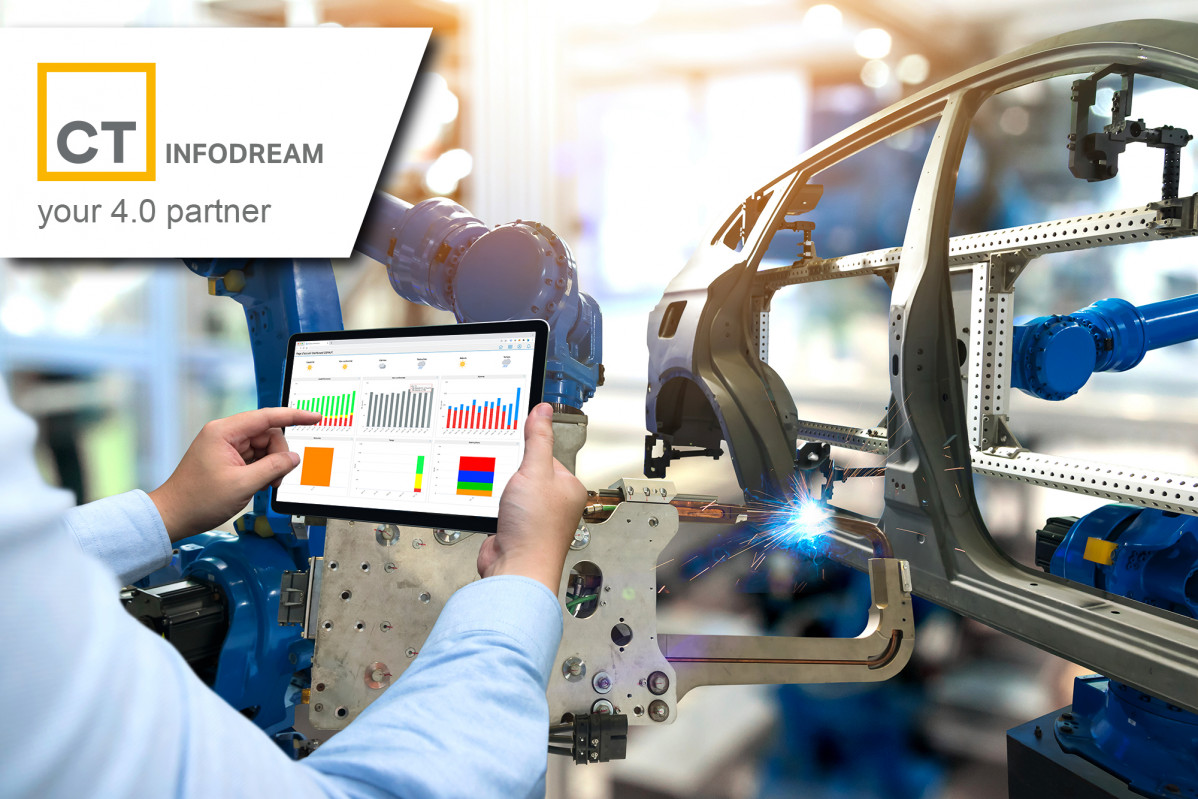Reactivity, flexibility and real-time flow improvement

Automotive plants, both for vehicles and components, continue to experience an unfamiliar dynamic due to the unstable demand that has been installed in the sector in recent years. This trend forces constant changes in production flows and this requires highly reactive management software to manage both growth and possible drops in production. Three firms that are experts in these types of management software analyse how MES and ERP systems are evolving in such volatile demand environments, among other issues. Repor published in AutoRevista 2.398.
According to José Antonio Calvo, PreSales and Consulting Manager at Abas in Spain, in our country “MES and ERP systems are increasingly adopting cloud-based solutions to respond to the uncertainty of the automotive sector. This model offers scalability, security, high availability and a flexible infrastructure, allowing companies to quickly manage changes in demand and facilitate their expansion into global markets.”

Regarding how these systems connect to the supply chain to ensure that external flows are aligned in the best possible way with the operation of the plants, he says that “the current trend in Spain points towards the integration of ERP in the cloud with technologies such as IoT, which provide real-time data, and blockchain, which reinforces traceability and security in logistics flows. These innovations facilitate collaborative planning and ensure greater alignment between internal operations and external flows, optimizing supply chain management.”
In terms of challenges, on the other hand, Calvo indicates that a key challenge in Spain is the transition from traditional systems to modern technologies in the industrial environment. “The convergence of IT and OT requires ensuring consistent and secure data flows, which implies a focus on tools designed to connect both environments efficiently, respecting the particularities of each sector,” he points out.
Regarding the inclusion of Artificial Intelligence in automotive plant programs, he states: “Artificial intelligence has great potential to improve areas such as predictive maintenance and advanced data management. However, in the industrial field, it is essential to prioritize a specialized ERP that incorporates AI capabilities in a practical and collaborative way, instead of relying solely on excessively complex technologies. The key is to implement functional solutions adapted to daily work, maximizing the value of these tools without falling into the oversizing of projects.”
More flexible and adaptable MES
Pierre Laclais, Head of Communications and Marketing at CT Infodream, indicates that MES systems are evolving towards greater flexibility and adaptability, responding in real time to changes in demand and adjusting production flows to maximize efficiency. “At CT, we work on customized solutions that maximize the response capacity to any challenge,” he says in this regard.
Regarding how these systems connect with the supply chain to ensure that external flows are aligned in the best possible way with the operation of the plants, he assures that “MES solutions, such as our own Qualaxy Suite solution, are designed to efficiently integrate production data with the supply chain. This allows for real-time synchronization, improves traceability, optimizes logistics planning and ensures precise alignment between external flows and the internal operations of the plants,” he asserts.
Regarding the recent challenges that management software companies are encountering, he explains that “getting IT and OT to work in harmony requires developing systems that directly connect the plant with strategic areas. Among the main challenges are organizational silos, the integration of legacy systems, and concerns related to cybersecurity. At CT, we focus on simplifying this convergence by guaranteeing solutions tailored to the needs of each client”. Finally, regarding the possibilities of including artificial intelligence tools in management software programs in automotive plants, he considers that “this software can be coupled with Artificial Intelligence platforms that are effective, easy, and quick to implement for SMEs in general and industrial ones. By taking advantage of the enormous amount of data generated by mass production, AI can: alert in advance of any sign of deviation, identify the causes of deviations that cause lack of performance, quality, or loss of materials, suggest solutions as soon as deviations are detected. In addition, AI can automate repetitive tasks and assist in strategic decision-making thanks to machine learning algorithms,” he concludes.
Two-way flow of data in real time
José Blay, Senior Consultant for the Automotive Industry at Infor, says that “MES and ERP systems are evolving towards greater integration and flexibility to adapt to market volatility. MES systems allow real-time monitoring of production, offering accurate data to quickly adjust processes, while ERP systems integrate this data with strategic planning, optimizing inventories and resources. This synergy allows companies to react quickly to changes in demand. In addition, advanced technologies such as artificial intelligence and the Internet of Things (IoT) are being incorporated, which enhance predictive and prescriptive capabilities. These tools help anticipate fluctuations in demand and adjust both production and logistics efficiently. Interestingly, it is estimated that companies that implement effective integration between MES and ERP can achieve significant annual savings by reducing downtime and improving productivity. In today's highly competitive environment, this connection is key to transforming data into tangible value and maintaining competitive advantage”.

Regarding how these systems connect to the supply chain to ensure that external flows are aligned in the best possible way with plant operations, he says: “The integration between MES, ERP and supply chain management systems (SCM) allows for a bidirectional flow of data in real time. For example, ERPs can synchronize orders with suppliers, while MESs monitor the use of materials in the plant, ensuring consistency between inventories and production needs. Technologies such as IoT and connected sensors allow components to be tracked throughout the entire logistics chain, guaranteeing traceability and optimization of just-in-time (JIT) supply. This minimizes interruptions and improves operational efficiency. Taking all this into account, it is important to highlight that companies that have systems that allow them to easily adapt configurations based on market reality have an advantage over those that have to go through complicated processes to modify basic configurations of their systems. Unfortunately, in the automotive world, there are many companies that preserve old systems or systems that have been built to ‘put out fires’ and not designed to ‘innovate’,” he explains.
Regarding challenges, Blay indicates that “one of the main challenges is to overcome the cultural and technical barriers between IT and OT teams, which have historically worked separately. This includes differences in protocols, architectures and operational priorities. Integration generates large volumes of data that require advanced tools for analysis and contextualization. Many companies invest in new technology such as robots, video anomaly detection, infrared, RFID, etc… But then they do not have the capacity or knowledge to use the data generated in innovative ways. In addition, many OT teams are old and are not designed to connect with modern IT systems, which requires significant investments in infrastructure. Another important challenge is to guarantee cybersecurity in highly connected environments. IT/OT convergence expands the attack surface, requiring robust measures such as network segmentation, advanced authentication and continuous monitoring".
In conclusion, regarding the possibilities of including artificial intelligence tools in management software programs in automotive plants, he points out: “With the technology to collect the appropriate data, there are a multitude of options aimed at “hyperproductivity”. To achieve this, it is essential to have good visibility of the transactions that occur in the plant, and the defined processes. Artificial intelligence (AI) is transforming MES and ERP systems by introducing predictive capabilities. For example, it allows failures to be anticipated through predictive maintenance or production plans to be adjusted based on advanced market analysis. It also improves inventory control by anticipating future needs, optimizing resources and reducing waste. In logistics, AI-based algorithms can manage optimal routes to reduce costs and times. Another notable application is real-time analysis to detect anomalies or inefficiencies during production, which facilitates more agile and informed decision-making. To take advantage of the use of Artificial Intelligence, it is essential that the data base used is reliable and that there is a clear strategy for what is being achieved”.


La Asociación Nacional de Fabricantes de Automóviles y Camiones, ANFAC, ha presentado, en la mañana del 10 de julio, su Informe Anual.

Profesionales del primer nivel de las empresas de la industria de automoción y movilidad se han congregado en una jornada organizada por CEAGA en Vigo para ofrecer a los líderes del sector una visión práctica y multidisciplinar que les permita anticiparse y responder eficazmente a los desafíos del entorno.

SERNAUTO ha publicado su memoria de Sostenibilidad 2024, en formato Informe Integrado, que constituye un análisis exhaustivo de la actividad, aportación de valor y papel activo de la entidad como portavoz del sector.

La planta de Stellantis en Melfi (Italia), se equipará con la nueva tecnología PixelPaint de ABB con pintura monocapa de Nippon Paint para crear la pintura bitono del nuevo buque insignia, el N°8 de DS Automobiles.

El fabricante francés anuncia el modelo que se fabricará en Curitiba (Brasil) y Bursa (Turquía).
